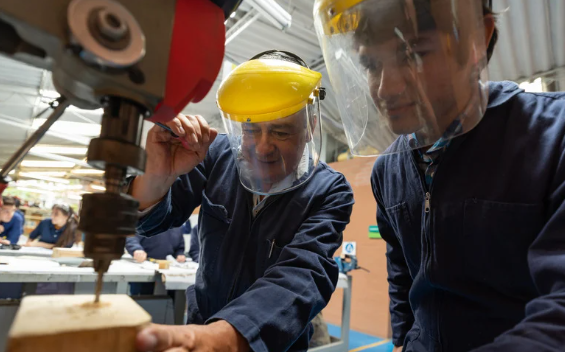How to prepare an interview in Canada
- DONG LI

- Sep 8, 2024
- 4 min read
Updated: Sep 24, 2025
Preparing for a job interview in Canada requires more than simply practicing answers to common questions. For newcomers, the process can feel particularly challenging because interviews often reflect not only technical abilities but also cultural fit, communication style, and awareness of Canadian workplace norms. By investing time in thorough preparation, you can increase your confidence, make a strong impression, and ultimately improve your chances of success.

Researching the Company and Industry
One of the most important aspects of preparation is thorough research on the prospective employer. Canadian hiring managers expect candidates to demonstrate a genuine understanding of the organization. This involves studying the company’s mission, vision, and values, as well as reviewing recent press releases, annual reports, and social media activity. Such preparation enables candidates to speak with authority about the company’s goals and culture.
Understanding the broader industry is equally valuable. For instance, candidates seeking positions in the technology sector should be familiar with emerging trends such as artificial intelligence, automation, and cybersecurity, while those pursuing opportunities in healthcare should understand Canada’s ongoing public health priorities. Tools such as the Government of Canada’s Job Bank – Trend
Analysis provide free insights into industries, occupations, and labour market forecasts, making them particularly useful for newcomers.
The job description itself should not be overlooked. Candidates are advised to identify the most important qualifications listed and prepare examples from their professional history that align with these requirements. This allows for targeted and compelling responses during the interview.
Understanding the Canadian Job Market and Workplace Culture
Canadian employers place significant emphasis on workplace culture. Collaboration, inclusivity, and mutual respect are fundamental values across industries. For this reason, candidates should be prepared to highlight experiences that demonstrate adaptability, teamwork, and cross-cultural communication.
Language proficiency is another crucial factor. Whether the interview is conducted in English or French, candidates must communicate with clarity and professionalism. Those seeking to improve their language skills may access free and affordable resources such as the Language Portal of Canada, YMCA Newcomer Services, or online tools such as Duolingo.
Preparing Responses Effectively
Interviews in Canada often incorporate behavioral, situational, and technical questions. A structured method such as the STAR approach—Situation, Task, Action, Result—ensures responses remain clear and impactful. Candidates should expect to address questions such as:
“Tell me about yourself.”
“What are your strengths and weaknesses?”
“Why do you want to work here?”
“Describe a challenging situation and how you handled it.”
In addition to these, industry-specific technical questions are frequently posed, particularly in fields such as information technology, engineering, and finance. Newcomers can prepare by practicing mock interviews, many of which are available online. For example, Indeed’s Interview Preparation Guide and ACCES Employment Workshops provide free, practical tools. Online simulators such as Big Interview offer structured practice and feedback that can be invaluable for self-assessment.
Asking Thoughtful Questions
Employers in Canada expect interviews to be a dialogue rather than a one-sided evaluation. Candidates who ask informed, thoughtful questions demonstrate both engagement and professionalism. Appropriate questions might include inquiries into how performance is measured, what opportunities exist for professional growth, or how the team collaborates on projects. By contrast, questions about salary or vacation time are best reserved for later stages of the hiring process.
Observing Interview Etiquette
Etiquette remains a cornerstone of a successful interview. Punctuality is highly valued in Canadian culture; candidates should arrive 10 to 15 minutes early for in-person interviews or test their technology in advance for virtual meetings. Professional attire—typically business casual or business formal—is advisable unless otherwise specified.
Non-verbal communication also carries weight. Maintaining eye contact, sitting with good posture, and offering a firm handshake (for in-person meetings) all convey confidence. It is equally important to listen attentively, avoid interruptions, and remain polite throughout the conversation. In virtual interviews, testing platforms such as Zoom or Microsoft Teams in advance ensures a professional experience without technical difficulties.
Preparing Professional Documents
Having appropriate documentation readily available reinforces professionalism. Candidates should bring multiple printed copies of their résumé, even if the interviewer already has one. Canadian résumés are expected to be concise, results-oriented, and free from personal information such as photographs or marital status. Helpful guidance and templates are available through Settlement.org – Canadian Style Resume.
Tailored cover letters further demonstrate commitment to the position, while a list of professional references, ideally including at least one Canadian contact, may be requested. For roles in creative industries or technical fields, a professional portfolio is highly recommended. Tools such as Behance or Canva allow newcomers to design and showcase their work in a polished format.
Following Up After the Interview
The process does not end once the interview concludes. Sending a thank-you email within 24 hours is standard practice in Canada. A well-written message should express gratitude for the opportunity, reference a specific aspect of the discussion, and reaffirm enthusiasm for the role. This small but significant gesture distinguishes a candidate as both professional and courteous.
Self-reflection after each interview is also valuable. Noting what went well and identifying areas for improvement helps candidates refine their performance over time. Many settlement agencies, including SUCCESS in British Columbia and ISANS in Nova Scotia, provide free coaching sessions to support newcomers in improving their interview techniques.
Conclusion
Successfully preparing for an interview in Canada requires a holistic approach that combines research, communication, etiquette, and follow-up. For newcomers, the process may feel unfamiliar at first, but with the right preparation and use of available resources, each interview becomes an opportunity to learn, adapt, and grow. By showcasing both technical abilities and cultural adaptability, candidates can position themselves as strong contributors to the Canadian workforce.
Useful Resources for Interview Preparation in Canada:
Labour Market and Career Research
Government of Canada Job Bank – Trend Analysis
WorkBC Labour Market Information
Language and Communication Skills
Language Portal of Canada
YMCA Newcomer Services
Duolingo
Interview Preparation and Practice
Indeed – Interview Preparation Guide
ACCES Employment Workshops
Big Interview
Résumé and Document Support
Settlement.org – Canadian Style Resume
Behance – Portfolio Platform
Canva – Professional Portfolio Design
Newcomer Employment Services
SUCCESS (British Columbia)
ISANS (Nova Scotia)
MOSAIC (British Columbia)




Comments